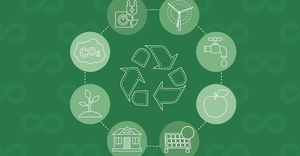Recycling hits the iceberg of oversupply.
We're now four months into the worst market for recyclables in this decade. As a result of the worldwide recession, prices for most recyclables have collapsed. At the local level, municipal recycling programs have seen their revenues drop as profits turn into losses.
As I write this column, I'm looking at news stories about the state of the American economy. These stories cite a 2 percent production drop at factories in December, wage cuts and job layoffs. The news from abroad is equally bad with most countries in the throes of a recession.
With news like this, we have good reason to be concerned about the state of recycling. Recyclables, after all, are an industrial raw material. Recycling is strongest when the economy is humming along. Yet in spite of the collapse of demand for recyclables, few municipal recyclers are crying that the sky is falling. With prices scraping the bottom of the barrel, you'd expect wailing and gnashing of teeth. Instead, programs continue to collect and process recyclables. Yes, some of those materials are being stored, but others are moving, slowly, to end markets. Since the end of November, when the press discovered the collapse of our markets, I've seen more news clippings about new or expanding programs than about discontinued programs. Only a few municipal recycling programs have gone under, and they were in small rural towns far from strong markets.
Is this the calm before the storm? Perhaps. Recycling's real test will start in March and April when cities and counties begin approving their yearly budgets. Local governments will cut spending in response to declining revenues. They will be making hard choices regarding which programs to fund and which to cut. Recycling will be competing with schools, mass transit, libraries, parks and other programs for a slice of the budget pie. If the market slump continues into the spring and warehouses start to overflow with unsold recyclables, local governments will be under increasing pressure to scale back or even abandon their recycling programs. They will push their state legislatures to relax recycling mandates or subsidize their programs.
Recyclers know that any city that stops collecting recyclables will find it hard to restart a program when markets are stronger. Citizen participation in recycling programs can't be turned on and off like water in a spigot. If we are serious about building a sustainable, green future, we need to continue recycling.
Yet the question remains: How do we sustain recycling when manufacturing is in decline and markets are weak? Recycling advocates have been wrestling with this issue on Capitol Hill and in state capitols. Unfortunately, few of the proposals focus on increasing the demand for recyclables.
On the demand side, recycled content mandates are offered as a solution. However, while they guarantee an end user, these mandates can't guarantee that those end users will pay a "good" price for recyclables.
The best demand-side solution will involve strengthening America's paper industry because paper is the most important material for residential and commercial recycling programs. As demand for paper products increases, recycling will be able to get back on its feet. Until then, recyclers will have to be patient, focus on efficiency, improve the quality of their materials and wait for the economy to improve.
Chaz Miller is state programs director for the Environmental Industry Associations, Washington, D.C.
Opinions in this column do not necessarily reflect those of the National Solid Wastes Management Association or the Environmental Industry Associations. E-mail the author at [email protected].
About the Author(s)
You May Also Like




